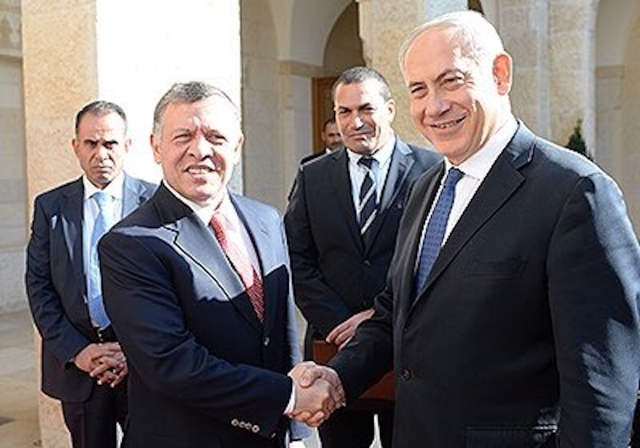Prime Minister Benjamin Netanyahu flew to Jordan this past Tuesday for a meeting with King Abdullah II of Jordan. The two leaders discussed regional issues, emphasizing the strategic, security, and economic cooperation between Israel and Jordan which contributes to the stability of the region. Also, the two blessed the long-standing friendship and partnership between the State of Israel and the Kingdom of Jordan.
This is Netanyahu's first public visit to Jordan in five years. The visit comes amid revived tensions between Jordan and Israel surrounding the visit of National Security Minister Itamar Ben Gvir to the Temple Mount about three weeks ago and the delay by security forces of the Jordanian ambassador's visit to the compound about a week ago. This is also Netanyahu's first trip abroad since returning to the position of Prime Minister.
Prime Minister Benjamin Netanyahu flew today to Jordan to meet with King Abdullah II. The two leaders discussed regional issues, especially strategic, security and economic cooperation between Israel and Jordan, which contributes to regional stability.
— Prime Minister of Israel (@IsraeliPM) January 24, 2023
The Jordanians often use opportunities to slam Israel in public as it helps quiet their citizenry, of which two-thirds are 'Palestinian'. The Kingdom is anything but democratic with the parliament often calling for the dissolution of the agreement between Israel & Jordan while the King ignores the majority votes. Jordan also harbors terrorists who attacked and killed Israelis and in the case of Ahlam Tamimi, who helped kill 15 including 8 children in the Sbarro Pizza bombing in August of 2001, allowed her to rise to celebrity status in the country.
In a statement published by the King's Office, it was stated that King Abdullah emphasized to Netanyahu the importance of maintaining the historical and legal status quo at the Al-Aqsa Mosque. The king told Netanyahu that calm behavior must be maintained in Judea and Samaria and acts of violence must be stopped in order to create a political horizon between Israel and the Palestinians. "Any action that could harm the opportunity for peace must be avoided," the king told Netanyahu.
Netanyahu makes surprise visit to Jordan today. Was this first meeting since 2018 between Bibi and King Abdullah meant to reassure Jordan over the status quo or simply to start off on the right foot after tense relations between the two? https://t.co/M8eLtJLAdD @all_israel_news
— Joel C. Rosenberg (@JoelCRosenberg) January 24, 2023
Jordan agreed when they signed a peace deal with Israel in 1994 that the country's religious 'Waqf' would allow Jewish visitors to the site. After the Six-Day-War in which Jordan was defeated and fled Jerusalem, Israel as a sign of good faith offered to allow the Waqf to administer the Al Aqsa mosque. This agreement is not written and can be revoked by Israel at any moment, however for now Israel is content with the arrangement as long as Israeli visits are not blocked.
The King told Netanyahu that Jordan is committed to establishing a Palestinian state based on the 1967 lines with East Jerusalem as its capital and that it will live in peace alongside Israel. The King discussed with Netanyahu the cooperation between the countries and emphasized that the Palestinians should benefit from regional projects that will be carried out as part of the Abraham Accords and the most recent Negev Forum that took place.
'Netanyahu didn't want to come to Jordan, he had to come to Jordan,'
— i24NEWS English (@i24NEWS_EN) January 24, 2023
says journalist @daoudkuttab on the meeting between Israel's Prime Minister and King Abdullah, adding that efforts by the U.S. and UAE helped broker the tense meeting #TheRundown | @calev_i24 pic.twitter.com/BJbkUJ4xS0
Jordan's vision for a Palestinian State is counter to that of Netanyahu and his coalition government. In fact, after several 'peace deal' offers to the Palestinians were rejected since the 1993 Oslo Accords, most Israelis do not back pre-1967 borders. In fact, before the war in 1967, Judea and Samaria were controlled and annexed by Jordan. There was no Palestinian entity or even a Palestinian people. It was only after the war that the movement picked up steam. In 1988 when Jordan renounced all claims to the area, the violence from Palestinians escalated along with the rhetoric of an ancient claim to the land. Today, most Palestinians themselves would not be satisfied with the 1967 borders as they have been taught for decades that all of Israel is Palestine.
A senior Israeli official said that the meeting between Netanyahu and the king lasted two hours and was in good spirits. The meeting was also attended by Strategic Affairs Minister Ron Dermer, National Security Advisor Tzachi Hanegbi, Chief of Staff in the Prime Minister's Office Tzachi Braverman, Shin Bet Chief Ronan Bar, and the Prime Minister's Military Secretary Major General Avi Gil. "The meeting expresses the good relations between the Israeli and Jordanian security organizations.", said the anonymous senior Israeli official to reporters.
Ben Gvir vows to keep going up to #TempleMount: I don’t follow Jordanian policy. Far-right national security minister makes promise a day after Netanyahu met Jordan’s King Abdullah II, telling him Israel would preserve status quo at Jerusalem holy site [TOI] #Israel #Jordan pic.twitter.com/HRRBC2P7Fh
— Eli Dror (@edrormba) January 25, 2023
During the meeting with King Abdullah, Prime Minister Netanyahu reiterated his position, which he has emphasized several times in recent weeks, according to which the government will maintain the status quo in the holy places in Jerusalem. Ron Dermer, seen as a close ally and partner of Netanyahu said in response to the meeting "I have been to many meetings between Netanyahu and King Abdullah and this was one of the best between them.”


